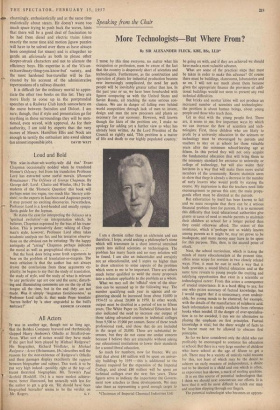Speaking from the Chair
More Technologists—But Where From?
By SIR ALEXANDER FLECK, KBE, BSc, LLD*
I THINK by this time everyone, no matter what his occupation or profession, must be aware of the fact that the country is desperately short of scientists and technologists. Furthermore, as the construction and operation of plants for industrial production become ever increasingly complicated, the need for such people will be inevitably greater rather than less. In the past year or so, we have been bombarded with figures comparing us with the United States and Soviet Russia, all reaching the same serious con- clusion. We are in danger of falling ever behind world competition through lack of men to invent, design and man the new processes and plants so necessary for our economy. However, well known though the facts of the problem are, I make no apology for adding yet a further view to what has already been written. As the Lord President of the Council so rightly said, 'This problem is a matter of life and death to our highly populated country.'
I am a chemist rather than an alchemist and can therefore, I hope, avoid seeking a philosopher's stone which will transmute in a short interval untrained youth into skilled scientists or technologists. The problem has many facets and no easy solution will be found. I am also an industrialist and certainly not an educationalist, and I aspire no higher than to draw attention to some aspects of the problem which seem to me to be important. There are others much better qualified to weld the many proposals into a solution applicable to.the problem as a whole.
What we may call the 'official' view of the situa- tion can be summed up in the following way. The number qualifying each year in science and en- gineering should be increased from about 10,000 in 1954-55 to about 20,000 in 1970. In other words, output must be doubled in a period of ten to fifteen years. The White Paper on Technical' Education has also indicated the need to increase our output of those taking advanced courses in technical colleges from 9,500 to 15,000 per annum. Some of these reach professional rank, and those that do are included in the target of 20,000. These are substantial in- creases, but they do not cause me undue concern because I believe they are attainable without asking our educational institutions to lower their standards for a sound liberal education.
So much for numbers, now for finance. We are told that about £40 million will be spent on univer- sity buildings by 1959 — this is additional to the finance required for the expansion of the Imperial College, and about £80 million will be spent on technical colleges over the next five years. These figures serve to indicate the importance the Govern- ment now attaches to these developments, We may take them as representing a good enough target to *Chairman of Imperial Chemical Industries Ltd. be going on with, and if they are achieved we should have made a most valuable advance.
What are some of the practical steps that must be taken in order to make this advance? Of course
there must be buildings, classrooms, laboratories and so on. I will not say much about them because given the appropriate finance the provision of addi- tional buildings would not seem to present any real technical difficulties.
But bricks and mortar alone will not produce an increased number of scientists and technologists : the problem is about human beings, about young people and those who teach them.
Let us deal with the young people first. There are, it seems to me, five important ways by which we can increase the flow of scientists and tech- nologists: First, those children who are likely to profit by a university education in the sciences or technology must be encouraged by parents and teachers to stay on at school for those valuable years after the minimum school-leaving age at fifteen. In this period they will not only acquire the fundamental education that will bring them to the necessary standard for entrance to university or college of technology, but will also widen their horizons in a way that will make them more useful members of the community. Recent statistics seem
to show that there is already a decrease in the number of early leavers who would profit by staying the course. My impression is that the teachers need little encouragement to pursue this aim; the main propa- ganda effort must be directed at the parents.
But exhortation by itself has been known to fail and we must recognise that there can be a serious financial problem here for parents. It is to surmount this difficulty that local educational authorities give grants in cases of need to enable parents to maintain their children at school for a longer period than they could otherwise afford. The extent of this assistance, which ic`perhaps not as widely known among parents as it might be, may yet prove to be inadequate, and more money may have to be spent for this purpose. This, then, is the second point of attack.
Next, the school curriculum, which is taxing the minds of many educationalists at the present time, offers some scope for revision in two closely related ways. First, it must be cast in such a way that it both provides a sound liberal education and at the same time reveals to young people the exciting and satisfying opportunities that exist in a scientific or• technological career. From this arises a consequence of crucial importance. It is a hard thing to say, for one who prizes accuracy of factual knowledge, but I would suggest that it is unnecessary, even undesir- able, for young minds to be cluttered, for example, with the details of the manufacture of sulphuric acid. Such information is readily available from reference books when needed. If the danger of over-specialisa- tion is to be avoided, I can see no alternative to placing the emphasis on first principles. Factual knowledge is vital, but the sheer weight of facts to be learnt must not be allowed to obscure first principles.
So far we have considered only the child who can profitably be encouraged to continue his education at school. But there is a very large number of children who leave school at the age of fifteen to get a job. There may be a variety of entirely valid reasons for this, not least of which may be the desire to achieve an early measure of independence, a desire not to be decried in a child and one which is often, as experience has shown, a mark of sterling qualities. It is on this source of potential technologists that I think we should next concentrate our efforts. It is here that it will be most difficult to catch our man and stop him slipping through our fingers.
The potential technologist who becomes an appren- Lice at sixteen stands a very good chance of having his talents spotted. He will then probably spend one full working day a week at technical college for two years. If it is then apparent that he is going to go farther, he may be selected for a sandwich course, six months in industry and six months in a technical college for three or four years. Equally, as many still do, he may carry out his studies on a part-time basis or in his spare time.
The danger is that many capable of starting on an apprenticeship at about sixteen may, when they leave school at fifteen, drift into a wide variety of jobs where they will lose the opportunity to exploit their latent talents. It is at this point that industry can take a hand by providing some form of preliminary vocational training for their own employees up to the time those who merit it are selected for an apprenticeship. It may be possible only for the larger companies to provide facilities for organised training, say, a six months' course. During this course instruc- tion and practice in the craft trades as well as a little preliminary work in drawing and chemistry might take place under the regular supervision of a trained man who would be able to assess the paiticular vocation for which a boy was suited. But even smaller companies should be able to make a point, as many do, of making rather more than a superficial assess- ment of their young employees. It is, after all, in their own interests to do so, since the best long-term investment that a firm can make is in its human material.
Finally, the Government and local authorities will have to ensure that all scholars who merit a university education can get it. The difficulties facing parents in the middle-income bracket, who receive little or no financial assistance for a university education, cannot be disguised. Their situation may lead to a growing tendency on the part of industry and other bodies to award scholarships free of the means test. These additional awards are highly desirable, but who can be sure that the most suitable young people will be selected across the country as a whole by this somewhat fortuitous method?
These, then, are five of the ways in which we can add to our numbers of scientists and technologists, but we have yet to find the number of teachers we shall need. The responsibility for staffing our educa- tional institutions lies primarily with the Govern- ment and local authorities, but I am afraid that we are far from a solution of the problems of recruiting and training the necessary number of lecturers and teachers of the right quality.
I am not competent to enter on the important question of adequate remuneration to the teachers and lecturers and the relative remuneration for different levels of capacity and responsibility. The importance of this matter must not be overlooked. Additionally, however, to the monetary rewards, there is the spirit of evangelism which is vital to a teacher. To ordinary mortals among the teachers, that spirit must be maintained by fresh injections of some of the missionary spirit which has made itself evident among teachers in many forms through the history of mankind. And so I emphasise the wisdom of properly staffed refresher courses. This is one method, Already used to some extent, by which the spirit of enthusiasm can be re-created and fresh ideas instilled. In my sphere of activity, I am accustomed to believe in the wisdom of such training and refresher courses taken throughout an active career. But perhaps even something more ambitious is required, something in the nature of a residential college, where staff from technological centres and indeed from industry can meet and receive inspiration from the impact of active minds considering common problems. • These points, an emphasis on first principles in a well-balanced curriculum, and the full exploitation of talent at school, in vocational training and at university, I would commend in particular for examination by the experts. More and better teachers are required and they should be attracted to their profession by stimuli, material and mental, which take due account of its importance and worthiness. All this will cost money, perhaps more than has been already estimated. But many years in industry have convinced me that if you want something, you usually have to pay for it.



































 Previous page
Previous page